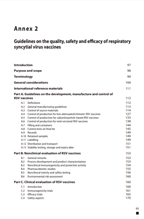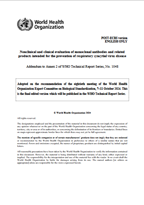Respiratory Syncytial Virus (RSV)
Introduction
Respiratory syncytial virus (RSV) is a leading cause of acute lower respiratory infections and associated hospitalizations in infants and children globally. Nearly all children will have experienced at least one RSV infection by their second year of life. In 2019, there were 33 million RSV-associated cases of acute lower respiratory airway infection, 3.6 million RSV-associated hospital admissions, and 101 400 RSV-attributable deaths in children under 5 years of age. Over 97% of pediatric RSV-related deaths occur in children living in low- and middle-income countries.
RSV Immunization Products and WHO Recommendations
Licensed immunization products for RSV include maternal vaccines and monoclonal antibodies to protect infants as well as vaccines to protect old adults and immunocompromised individuals.
These include the following products:
- RSV prefusion-F protein vaccine (Pfizer, Abrysvo®) – approved for use in pregnant individuals and older adults
- monoclonal antibody—nirsevimab (AstraZeneca/Sanofi, Beyfortus™)— approved for infants
- monoclonal antibody - clesrovimab (Merck, Enflonsia™) - approved for infants
- mRNA-1345 (Moderna, mRESVIA®) – approved for older adults
- RSV PreF+AS01 (GSK, AREXVY®) – approved for older adults
WHO currently recommends the RSVpreF vaccine (Abrysvo®) for use in pregnant individuals to provide passive immunization to infants through transplacental antibody transfer. A single-dose presentation, with vaccine and sterile water for injection in separate vials to be mixed together, has also reached market authorization and been prequalified by WHO. In addition to vaccines, nirsevimab (AstraZeneca/Sanofi, Beyfortus™) is recommended by WHO for passive immunization of infants. Another monoclonal antibody, Clesrovimab (Merck, Enflonsia™) has also recently reached market authorization for infants. WHO has not yet reviewed the RSV vaccines for older adults to make WHO policy recommendations.
WHO recommends a single dose of the RSVpreF vaccine during the third trimester of pregnancy, as defined by local guidelines. For countries choosing to use nirsevimab, WHO advises that all infants receive a single dose at birth or as soon as possible thereafter.
Both RSVpreF and nirsevimab demonstrate high efficacy in preventing severe, medically attended RSV lower respiratory tract infections. Their administration may occur year-round or seasonally, depending on local RSV transmission patterns.
Vaccine rollout should be accompanied by safety monitoring—particularly of birth outcomes in vaccinated pregnant individuals—starting before or at the time of introduction.
For full WHO recommendations on RSV immunization products to protect infants, please see the WHO position paper.
Several other RSV immunization products are in clinical development (see RSV products pipeline).
WHO is engaging with PATH and other partners to raise awareness about RSV and new products on the horizon, to support global, regional, and country decision-making around RSV prevention, policy, and implementation preparedness. To advance these efforts, a suite of communications materials has been developed that public health stakeholders and advocates can use to share information and raise awareness about RSV disease, forthcoming prevention tools, and delivery considerations. These include presentation slides, fact sheets, and other resources that are available at the link below. These presentations are also available through a webinar series hosted by ReSViNET (Roadshow Web Series).
WHO Publications /Resources
WHO position paper on immunization to protect infants against respiratory syncytial virus disease,...
Recommendations on the use of maternal respiratory syncytial virus (RSV) vaccines and long-acting RSV monoclonal antibodies (mAbs) to prevent severe RSV...
Meeting of the Strategic Advisory Group of Experts on Immunization, September 2024: conclusions and recommendations
The Strategic Advisory Group of Experts (SAGE) on Immunization met on 23–26 September 2024. This report summarises their discussions, conclusions,...
Respiratory Syncytial Virus (RSV) is a leading cause of respiratory disease globally. The virus causes infections at all ages, but young infants have the...
This document describes World Health Organization (WHO) preferences for characteristics of monoclonal antibody (mAb) products used for passive immunization against...
RSV Vaccine Research and Development Technology Roadmap
Vision - There is a need for high-quality, safe, effective, affordable and accessible RSV vaccines that prevent severe disease and death in infants less...
The seventy-ninth meeting of the WHO Expert Committee on Biological Standardization was held virtually from 11 to 14 March 2024. The meeting was opened...
/immunization-vaccines-and-biologicals-(ivb)/immunization-analysis-insights-(iai)/who-global-market-study-on-rsv-immunization-products_november-2024-89.tmb-144v.jpg?sfvrsn=d31cd58a_1)
WHO Global Market Study on RSV Immunization Products
MI4A produces antigen-specific market studies, analyzing global demand and supply dynamics for products targeting a specific antigen.The Global Market...

Guidelines on the quality, safety and efficacy of respiratory syncytial virus vaccines, Annex 2, TRS...
Full version of the WHO Technical Report Series N° 1024Human respiratory syncytial virus (RSV) is a globally prevalent cause of lower respiratory...

Nonclinical and clinical evaluation of monoclonal antibodies and related products intended for the prevention...
Evaluating the safety and efficacy of monoclonal antibodies (mAbs) and related products intended for the prevention or treatment of infectious diseases...
WHO meetings
External links and publications
RSV products pipeline

